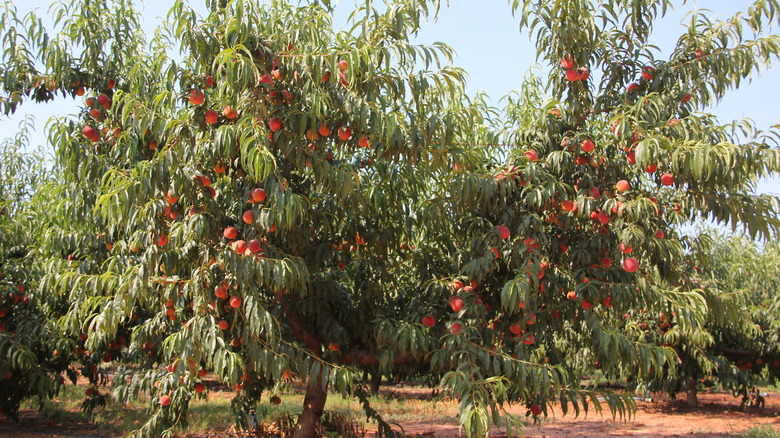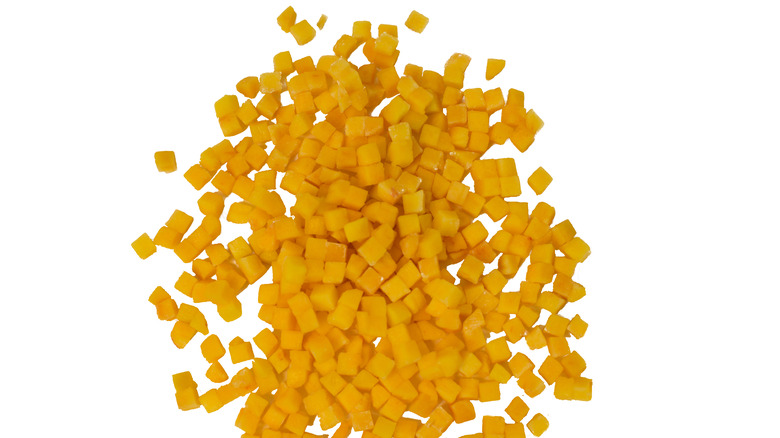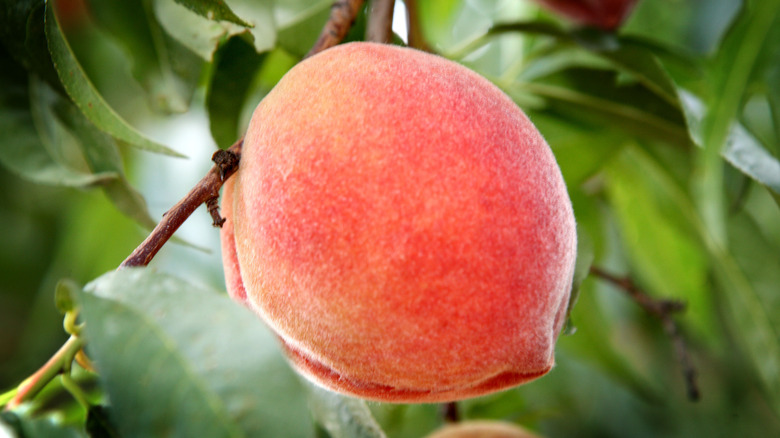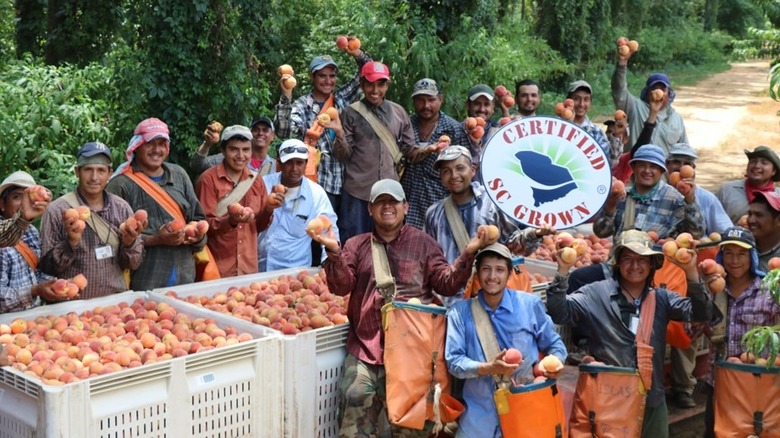South Carolina Is Home To The Second Largest Peach Producer In The US
What Napa is to California, the Old 96 District is to South Carolina – only here it's all about peaches. Spanning five counties of country roads, the sweetest peach aroma permeates the air come summertime. In fact, while Georgia holds "The Peach State" moniker, South Carolina actually dominates the industry (outside of California) as the second largest peach-producing state in the United States. Over 12,000 acres of peach orchards sprawl as far as the eye can see – a true feast for the eyes.
As one producer's name suggests its actual size, Titan Farms is home to 6,000 acres of more than 60 peach varieties making this produce company the second largest privately-owned peach farm in America. During a typical growing season roughly 50 million pounds of Titan Farms peaches are distributed across the country and also exported to Canada. In fact, shop at most any grocery store like Walmart, Harris Teeter, or Costco, and chances are good they came from Titan Farms.
But, grocery stores aren't the only place that Titan Farms peaches have a presence. The company's COO, Ross Williams explained to Tasting Table in an interview exactly how far its branches really reach.
Where to find Titan Farms beyond your grocery store's produce section
When asked what his company is most proud of, Ross Williams said, "Food waste production. In a normal year without our processing operations, we would be throwing away 18 million pounds of peaches." That's 95% of potential waste that would otherwise end up in a landfill, according to Williams. Titan Farms converts imperfect peaches into consumable goods for purees used in items like ice cream and juices, along with frozen sliced peaches. So, it stands to reason if you've bought one of these types of peach products, you've got a taste of South Carolina literally at your fingertips.
Another way that Titan Farms is utilizing these peach "seconds" is for the National School Lunch Program (NSLP). Funds allocated in the Farm Bill via the Fresh Fruits and Vegetable Program (FFVP) provide free and/or low-cost balanced meals to school children that Williams said are volume-based on the efficiency of pricing. Titan Farms processes peach cups, strawberry cups, and mixed berry cups for this program servicing American schools, including Puerto Rico and the U.S. Virgin Islands. Whatsmore, the farm's processing facility employs an additional 140 local and domestic residents during peak season.
The supply chain
Historically speaking, Titan Farms has collaborated with Georgia growers to help cover orders for large retail chain order fulfillment. "It's not about food fraud," Ross Williams outlined, saying that it's more about farms working together to create a consistent supply chain. However, due to the late frost of 2023 cutting most harvests by more than half, South Carolina's largest producer has chosen to keep its harvest in-house for distribution in 2023.
Even still, Williams said that branded vintage farm trucks that roll into your town selling farm fresh peaches are part of a greater marketing plan from large corporations — regardless if they are grown in Georgia or South Carolina. As he sees it, "High tides rise all ships. It's about driving the consumption of a commodity, and the crave for peaches."
He said that buying peaches straight from a truck reduces the days the peach takes to reach you. Storage temperatures can affect can affect the overall quality of your peach, so the fresher, the better. (Although, if you buy them from a grocery store, you still have a great peach on your hands). Williams recommended letting peaches sit on the kitchen counter out of direct sunlight for no more than two days. If you don't plan on consuming them right away, the peaches can last up to five days in the refrigerator.
The actual hands that raise Titan Farms peaches
The most important high tide to rise all ships when it comes to Titan Farms peaches are its migrant farm workers. "We're more sustainable and secure by employing outside the country. Import your food or import your labor, those are your two options," said Ross Williams. To his point, the U.S. Department of Labor certified around 370,000 temporary agricultural jobs in 2022 through the H-2A Temporary Agricultural Program.
As an H-2A program member since 1999 with a consistent 94% retention rate, Titan Farms employs 850 migrant farm workers annually. To be a part of the program, a farm must show a shortage of domestic workers, prior to petitioning for migrant workers' visas. Once proof is provided, Titan Farms contracts with workers predominately from Mexico offering wages, housing, transportation, health care, and other benefits.
"This is home for them. I've grown up here. They're family to me," Williams said, adding that he even calls some of the workers his "brothers." So, the next time you pick up some peaches, whether fresh or from the freezer, you can rest assured that while South Carolina may be home to the nation's second-largest peach producer, it takes more than a village to raise them.



